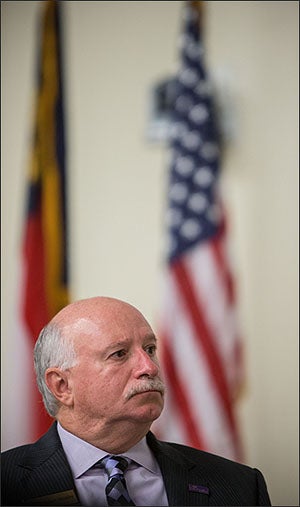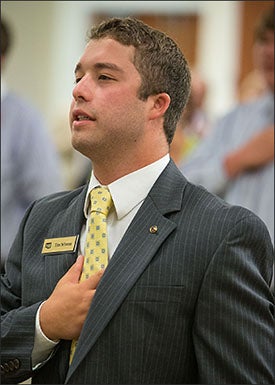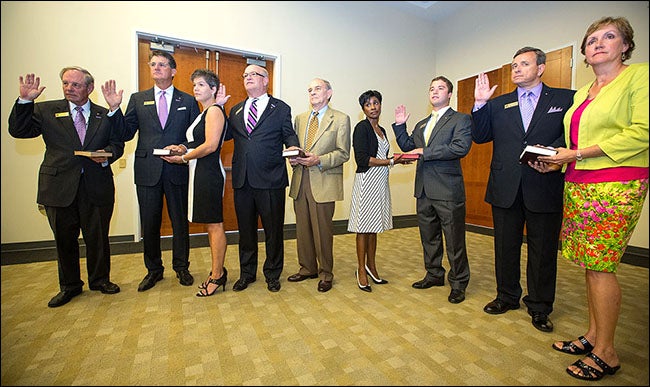‘BEST DAYS AHEAD’
ECU Board of Trustees installs new members, elects officers
East Carolina University’s Board of Trustees welcomed four new members and elected officers during its July 18 meeting at the East Carolina Heart Institute at ECU.
Robert Brinkley of Charlotte was elected chairman. Also elected were Steve Jones of Raleigh as vice chair and Edwin Clark of Greenville as secretary.

Robert Brinkley was elected chairman of the ECU Board of Trustees.
The four members joining the board are Bob Plybon and Terry Yeargan, who were appointed by the UNC Board of Governors; Vern Davenport and Max Ray Joyner Jr., who were appointed by Gov. Pat McCrory.
Tim Schwan, ECU’s Student Government Association president, was sworn in as an ex-officio member of the board.
A graduate of ECU with a degree in business administration, Plybon of Greensboro is past president of the board for the ECU Foundation. Plybon is chief executive officer of Plybon & Associates. He has received multiple awards during his career, including the outstanding alumnus award at East Carolina and the John Newton Russell Award, recognizing a lifetime of professional excellence in the life insurance industry.
Yeargan of Willow Spring has more than 35 years of experience in the construction industry, all in the Research Triangle Park area. He works in client development at DPR Construction, a national construction services firm based in San Francisco. He has served on multiple boards, including as chair of the Raleigh-Durham International Airport Board and chair of the Wake County Planning and Zoning Board.
He will continue his role as chair of the ECU Board of Visitors; his term on that board continues through 2014. Yeargan earned his bachelor of science degree in business administration-marketing at ECU in 1979.
Davenport of Wake Forest was most recently chief executive officer of M*Modal, which provides integrated clinical documentation in the health care industry. He earned his bachelor’s degree and his master’s degrees in business administration at ECU.
Joyner of Greenville is completing a term on the Greenville City Council, where he has represented District 5 since 2007. He works with the Clement Companies of Greenville and is active on multiple city boards, including the Pitt-Greenville Airport Authority. Joyner attended ECU and follows his father as a member of the Board of Trustees at ECU.
Schwan is a senior finance major from Hampstead. He is a Walter and Marie Williams Leadership Scholarship recipient, a member of the Jarvis Leadership Program and Phi Kappa Tau Fraternity. He also served as an ECU Ambassador, on the ECU Interfraternity Council and worked with the Police Athletic League at the Greenville Recreational Center.
After the vote, new chairman Brinkley said he was excited about working with the group and the opportunities ahead for the board and the university.
A member of the ECU Board of Trustees since 2007, Brinkley recently joined the Charlotte law firm Womble Carlyle.

Tim Schwan recites the Pledge of Allegiance during the meeting.
“The best days are ahead of us; not sure we’ve had a stronger, more talented board,” Brinkley said. “As the chancellor says after a win on the field or an accomplishment in the classroom: It’s a great day to be a Pirate. If we think big and focus, there’s no doubt in my mind that the greatest days to be a Pirate are in the future.”
During his remarks to the board, Chancellor Steve Ballard told the new trustees that they are part of “an extraordinary public university.”
Ballard shared the five areas that he and the university’s senior administrators see as central elements needed in the coming year:
- An aggressive advancement team. The new Athletic Director Jeff Compher and J. Batt, executive director of the Pirate Club, have hit the ground running, Ballard said, and the “critical” search for the new director of advancement is nearing a conclusion.
- Strategic planning. The university has been working on this almost continuously since 2007 and the adoption of “ECU Tomorrow.” The new strategic planning process will begin later in July; he asked board members to share their ideas at the September meeting. “A year from now to have a new strategic plan is the goal,” Ballard said.
- The Brody School of Medicine “is one of our most important and successful programs, but it is also extremely challenged fiscally, in part because we don’t own our own hospital and because it is 75 percent self-funded,” he said. Ballard added the school was recently recognized by the American Academy of Family Physicians as the top program in producing students choosing family medicine. “We worry about (Brody), not because it’s not doing its job but because of funding issues,” Ballard said.
- Efficiencies must continue to be examined in every area, Ballard said. “We know our students and their families are likely to have to pay more of the percentage of the cost of education. That’s happened in other states. The bigger burden should be placed on the university and how we organize ourselves,” he said.
- Enrollment management needs to be re-assessed on campus. John Fletcher, associate provost for enrollment services, and his team report that the freshmen class has almost 500 more students than last year. It will be the second largest freshmen class, Ballard said. “We didn’t lower our standards; our yield rate was the highest it’s ever been,” he said. This increase stresses our residence halls and our freshmen courses, he added.
In other business, the board approved unanimously the university to lease off-campus housing for approximately 200 upperclassmen in the fall and up to 400 students in the spring semester when Belk Residence Hall goes “off-line” and is torn down before being rebuilt.
“We have a good problem,” said Dr. Rick Niswander, vice chancellor for administration and finance, adding that because the yield of admitted students will be higher, more space on campus will be needed to house them.
Freshmen students will be housed on campus, as is the university’s policy, with limited exceptions. Upperclassmen will live in the off-campus housing.
The student fee for housing will be the same whether the students live on-campus or in off-campus housing, Niswander said.
